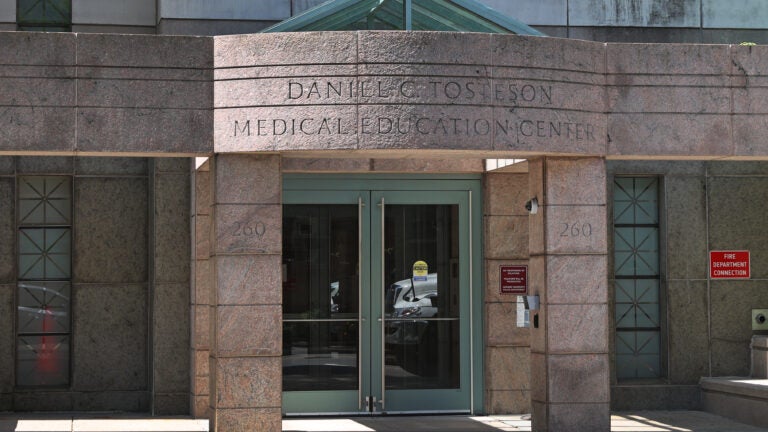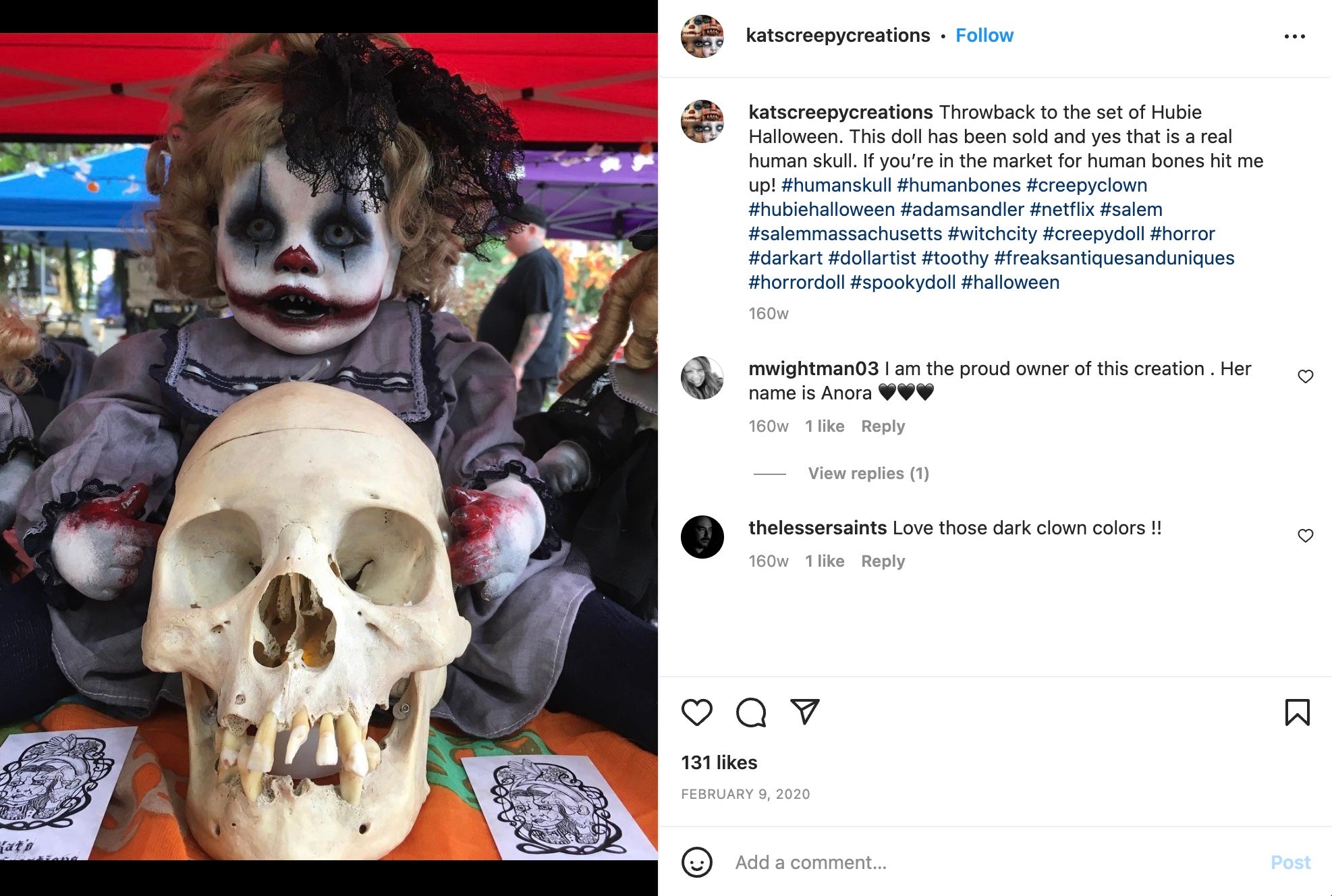Newsletter Signup
Stay up to date on all the latest news from Boston.com

As owner of Kat’s Creepy Creations, Katrina MacLean promised oddities “that shock the mind & shake the soul,” her now-shuttered Instagram page boasting pictures of dolls with fangs and vintage photos turned into macabre tableaus.
Sometimes, there would be bones — a skull nestled with a killer clown doll, or human vertebrae piled high in glass displays.
“Yes, that is a real human skull,” MacLean, a Salem resident, wrote in one 2020 post. “If you’re in the market for human bones hit me up!”
And bones were just the tip of the iceberg, according to a federal indictment released this week.
MacLean and several others were charged in an alleged scheme to steal and sell body parts from donated cadavers in the Harvard Medical School morgue. Prosecutors accused MacLean of agreeing to buy two dissected faces and of commissioning Pennsylvania man Jeremy Pauley to tan human skin to make leather, among other allegations. She did not respond to a request for comment.

Collecting and selling body parts is hardly a new phenomenon; for years, the human remains trade has thrived online, skirting rarely enforced social media policies. According to National Geographic, scientists found more than 450 skulls listed for sale on eBay between 2012 and 2013, before the platform banned the sale of human bodies and remains.
But is it legal to buy or own human body parts? It’s complicated, according to Tanya Marsh, a law professor at Wake Forest University School of Law and the author of “The Law of Human Remains.”
Other than the Native American Graves Protection and Repatriation Act, there is no federal law that forbids the transfer or possession of human remains, Marsh explained in an email interview with Boston.com. Notably, the federal charges filed against MacLean and others in the Harvard morgue case include conspiracy and interstate transport of stolen goods.
“Funeral and cemetery law is almost exclusively state law, and those state laws vary quite a bit,” Marsh said.
Despite widespread agreement that the sale of human remains should be illegal — at least without the person’s consent — only some states have laws that actually reflect that belief, according to Marsh.
By her count, there are 12 states where the allegations in the Harvard Medical School morgue scheme would violate human remains laws, including Massachusetts and New Hampshire, where former HMS morgue manager Cedric Lodge and his wife Denise allegedly committed some of their acts. Prosecutors say Cedric Lodge stole organs and body parts from his workplace between 2018 through 2022.
In Massachusetts, state law declares that anyone buying or selling a dead body can be punished by a fine between $50 and $1,000, or prison time between three months and 2 1/2 years. However, the law doesn’t explicitly mention whether partial human remains like bones or skin would also apply.
Another 25 states have laws that bar the sale or transfer of human remains under certain conditions, typically when those remains have been “unlawfully removed” or disinterred, Marsh explained.
“I think these are the kinds of laws that get passed following a crisis or well-publicized news story like this one,” she said. “So perhaps this will provoke some state legislatures to take a look at their laws and realize that if these actions took place in their state, no crime would have been committed.”
The penalties under Massachusetts law are much lower than the penalties for the crimes alleged in Wednesday’s federal indictment, which may explain why prosecutors opted to pursue the case under federal law, Marsh explained. The case also involves defendants in Pennsylvania, which doesn’t have an applicable human remains law, she noted.
Another unusual legal facet to the case? The federal charges concern stolen goods.
“This is surprising because I haven’t found any precedent of human remains being treated as ‘goods’ within the meaning of the federal statute,” Marsh said. “In fact, it is a longstanding common law principle in the United States that human remains are not property.”
In practice, the patchwork of laws surrounding the sale of human remains creates a number of gray areas.
Take Pennsylvania, for example.
Following the 2022 arrest of Jeremy Pauley, a Pennsylvania man also charged in the human remains trafficking scheme, Dauphin County Coroner Graham Hetrick told local news station WGAL that it’s legal to possess body parts as long as the remains were legally obtained.
There are some limits, however: “You can’t have decomposing bodies in your house,” Hetrick told the news station. “That’s a health hazard.”
Meanwhile, buying human remains might be easier than you’d think.
A 2017 Reuters investigation delved into the multimillion-dollar industry of dissecting, renting, and selling donated bodies — typically for research and educational purposes. As part of that series, a Reuters reporter legally purchased two heads and a cervical spine.
“Although it’s illegal to sell organs used for transplants, it’s perfectly legal in most states to sell body parts that were donated for research or education,” the Reuters series reads. “Buying wine over the Internet is arguably more tightly controlled, generally requiring at minimum proof of age.”
Already, the legal ramifications of the Harvard morgue case are spreading beyond federal court. John Bozek, a Tewksbury man whose mother donated her body to Harvard upon her death in 2019, filed a lawsuit against the school and Cedric Lodge in Suffolk Superior Court Friday.
Bozek is seeking to become the lead plaintiff in a class action suit with other families whose loved ones were impacted.
For its part, Harvard Medical School has said it had no prior knowledge of the alleged criminal activities until notified by the FBI in March.
Aiming to bolster security, Harvard has appointed an external panel of experts to evaluate its Anatomical Gift Program and morgue policies and practices, HMS Dean George Q. Daley and Dean for Medical Education Edward M. Hundert explained in a joint message Wednesday.
“We owe it to ourselves, our community, our profession, and our patients and their loved ones to ensure that HMS is worthy of the donors who have entrusted their bodies to us for the advancement of medical education and research,” the pair wrote. “There is nothing more sacred and worthy of our attention and respect.”
Several families have since spoken out in outrage and confusion after learning that their loved ones’ body parts may have been stolen from the morgue.
“From an ethical perspective, the alleged actions by the morgue manager is a horrifying breach of the trust that donors and donor families place in medical schools,” Marsh said. “It is just ethically indefensible.”
She added: “I imagine that this case is going to cause a lot of medical schools to take a very close look at the practices in their own morgues, and whether they have safeguards in place to prevent this kind of horrifying activity.”
Stay up to date on all the latest news from Boston.com
Stay up to date with everything Boston. Receive the latest news and breaking updates, straight from our newsroom to your inbox.
Conversation
This discussion has ended. Please join elsewhere on Boston.com